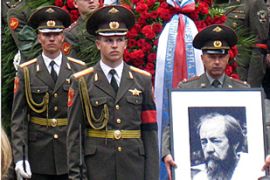Solzhenitsyn laid to rest in Moscow
Iconic writer devoted his life to documenting horrors of Soviet rule.

After a funeral march played by a military band, Natalya, Solzhenitsyn’s widow, threw a handful of earth into the grave.
Workers erected a plain wooden Orthodox cross 1.5 metres high.
“We will read and listen to him for a long time to come. Every one of his words is steeped in his own blood,” said Snezhana Krylova, a middle-aged teacher clutching a bouquet of yellow roses on her way to the funeral.
“We have to explain this to young people,” she added.
‘Unique person’
Solzhenitsyn won the Nobel Prize for literature in 1970 and is best known for his massive study of the labour camps, ‘The Gulag Archipelago,’ as well as novels like ‘One Day in the Life of Ivan Denisovich’ and ‘The First Circle’.
He was expelled from the Soviet Union in 1974 after the authorities found a manuscript of ‘The Gulag Archipelago’.
Mikhail Gorbachev, the Soviet Union’s last leader, eventually restored his citizenship in 1990.
 |
| Solzhenitsyn was critical of Putin’s government during the 1990s [AFP] |
After returning to Russia from the United States in 1994, the author eventually retired into seclusion to focus on his writing and was rarely seen during his final years.
“His ideas remain alive… He is the father or the brother of all political prisoners,” Vitold Abankin, a poet who was a political prisoner for 12 years during the Soviet era, said during the funeral.
Earlier, large wreaths were placed by the grave, including one from human rights group Memorial, which campaigns for former prisoners of the Soviet labour camps to receive pensions and for KGB archives to be opened up.
Solzhenitsyn selected the burial spot five years ago in a cemetery where many other leading anti-Soviet figures have been buried and he received special permission for it from Patriarch Alexy II, a church official said.
Yury Luzhkov, Moscow’s mayor, who greeted Solzhenitsyn upon the writer’s emotional return from exile in 1994, said: “He was one of our strongest personalities, a unique person.”
Solzhenitsyn was sharply critical of Russia’s chaotic free-market democracy in the 1990s but developed a closer relationship with Vladimir Putin, the current prime minister, who honoured the writer with a state prize last year.